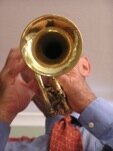
Robert Ronnow: New & Selected Poems 1975-2005
195 pages. ISBN 9780935306521 Bookstore order info
Retail price $18.95 Direct order by individuals from this site: $15.00 includes postage.
To place a book order...


Review by Lewis Turco:
Back in 1983 I wrote (in the Dictionary of Literary Biography Yearbook): How to describe Robert Ronnow’s Janie Huzzie Bows It’s impossible, but one must try. Take a look at the title: How does one read it What does it mean The poems are the same way - they prance along the edge of making sense. One can even follow them for a while, and then they drop off the edge into the swivel-eyed where you stand before a mirror staring cross-eyed at one of two noses. These are mad, enjoyable poems if one enjoys disorientation, getting dizzy on language. Ronnow puts some meaning back into the term “experimental,” but he knows what he’s doing, and he does it terrifically well. This is certainly “catastrophe theory” poetry. It is also a fascinating first book.
Now, in 2007, we have Ronnow’s New and Selected Poems that includes pieces from his second collection, Absolutely Smooth Mustard, which was published by The Barnwood Press in 1985 as White Waits, and two other collections apparently never published as individual books, Brother Death, and Belonging to the Loved Ones. It seems odd that a poet as accomplished as Ronnow is has had to wait (or, perhaps, just waited) twenty-three years to bring out a substantial collection.
His first book was anything but formal, but his second paid much more attention to traditional elements of versification, though he was certainly no slave to traditional forms. He did use rhyme and meter, though, and he called some of his poems “Chinese Sonnets,” but the only thing sonnet-like about them that I can see is their length: fourteen lines, and one can hear the ghost of pentameters behind them. If they seem a bit tamer than the earlier poems, they are nevertheless well written and entertaining in a sort of philosophical way, the philosophy being a combination of existentialism and pragmatism: “Despair / leads me to talk too much about myself rather than / be transcendent,” he admits.
In a poem such as “Change,” he goes back to being formally inventive, as he was in Janie Huzzie, and it’s still fun to follow him around to see what he’s going to do next. He does quite a number of different things in his writing, as he has done in his life....Personally, I’m very pleased to have become reacquainted with a poet whose work is both idiosyncratic and based in the best elements of the literary tradition.
Barnwood Press home